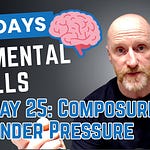Challenging negative thoughts is a mental skill essential for managing the demands of not only high-stakes situations but also those of everyday life. We talk to ourselves in almost every moment. Except for those situations where we are completely engrossed in something, our minds can be consumed with inner dialogue. Now, that’s not such a bad thing where the thoughts are supportive and encouraging, but where those thoughts are critical and abusive, we are unlikely to create the results we’d like to see.
Negative self-talk is often an automatic reaction to stressful events, the extent of which can be primarily influenced by our childhood environment. In youth, we develop or adopt a template for life and relationships. It runs on autopilot; you could say it is a product of System 1 thinking. We’re not stuck with it, however. According to Seaward (2006)1, reframing is a conscious coping technique that helps us become aware of our internal monologue, widening our perspective on particularly challenging situations. Steps involved in cognitive reframing include;
Becoming aware of our thoughts
Evaluating content.
And challenging negative perceptions by questioning their validity.
Modifying negative self-talk is essential in the process of learning to regulate our feelings. Research by Morin (2005)2 suggests that recognising self-talk helps us consider the perspectives of others in private speech and incorporate multiple perspectives into social and emotional problem-solving. Additionally, self-awareness, monitoring, and communication of our thoughts, feelings, and behaviours are essential prerequisites for healthy emotional functioning, or emotional competence, according to Saarni (1999)3.
I work with male under-18s in an amateur team sport environment. I played the game myself for years, and one of the significant keys to consistent and reliable performance for these lads is composure. If you lack composure, you lose your focus. The voice in your head takes over and tells you you’re a failure, or perhaps that everyone else is to blame. Regardless of where that blame is attributed, the critical voice in your head now runs the show; the game is lost.
How To Reframe Automatic Negative Thinking
Get yourself a journal if you don’t already have one. Then, for one week, note down those occasions where your mind jumps to negative judgments. Take time and space to do this exercise where you won’t be disturbed.
First, describe the situation that caused the judgment.
Then, note your initial negative thought about it.
Also note the emotions and feelings that followed this line of thinking.
Next, (and this is the crucial bit) ask yourself, is this thought accurate, could I be wrong about this—how could this situation be different?
Lastly, choose a more positive thought that may be equally true.
An example
A friend kept you waiting for 15 minutes.
Your initial thought was that they care only for themselves and not for your time.
You felt irritated and let down.
Then you considered the facts; you were there on time and he was late—that’s it. You elaborated on the possibilities further…maybe someone else delayed them.
Maybe they got caught in traffic. Maybe they have an unreasonable boss who keeps them late. Maybe… There could be any number of reasons why your friend was delayed, and entertaining the first thought as fact can be damaging to your state of mind. This is especially damaging if you are in a demanding role that requires composure and emotional stability. Instead of jumping to conclusions and flying off the handle, entertain other possibilities. You might say to yourself, for example;
“Hang on a second, does this thought have to be true? What’s an equally possible reason why this may have occurred?”
Then continue the conversation with yourself, taking your mind to less dramatic, equally possible scenarios. Couple this with a series of deep breaths, and you’ll notice your mind and body begin to calm down. Now, you may be able to take effective action.
This approach can be equally effective when considering both current and future conditions. If you are in the middle of a game, for example, and you feel it slipping away. Instead of catastrophising about the outcome, consider other positive possibilities. After all, it’s what you and your teammates do now that counts, not what you did ten seconds or ten minutes ago. Think differently. Talk differently to yourself. Learn to regulate your emotional state with truthful and positively oriented self-talk, and watch circumstances shift in your direction.
Mental Skills Basics Course
Suffering stress and anxiety is not a prerequisite for success in self-employment–there's a better way. Mental skills provide you with the means of coping effectively with difficulty and achieving your goals. I created the Mental Skills Basics Course to introduce business leaders, self-employed individuals, freelancers, consultants, and small business owners to the psychological and emotional skills associated with success.
Seaward, B. L. (2006). Stress management: Principles and strategies for health and well-being (5th ed.). Boston, MA: Jones & Bartlett.
Morin, A. (2005). Possible links between self-awareness and inner speech: theoretical background, underlying mechanisms, and empirical evidence. Journal of Consciousness Studies, 12(4-5), 115-134.
Saarni, C. (1999). The development of emotional competence. Guilford Press.











